
Customer service sales is essential for enhancing client satisfaction and driving revenue growth, as it strategically leverages client interactions to create upselling and cross-selling opportunities.
Effective customer service sales not only fosters loyalty and repeat purchases but also aligns seamlessly with marketing efforts.
This alignment ultimately positions businesses to excel in a competitive landscape, particularly as consumer expectations continue to evolve.
In the rapidly evolving landscape of business, the integration of customer service and sales has emerged as a crucial strategy for driving growth and enhancing customer satisfaction. As consumer expectations reach unprecedented heights, organizations are recognizing the imperative to transform every customer interaction into a sales opportunity. By equipping customer service representatives with effective sales techniques and fostering a culture of collaboration, businesses can not only boost their sales performance but also cultivate lasting customer loyalty.
This article delves into the significance of customer service sales in 2025, exploring:
Customer service sales represents a strategic approach that leverages client interactions to boost revenue and enhance overall client satisfaction—an essential tactic in today's business environment, where expectations are at unprecedented levels. By ensuring that each interaction serves as an opportunity to build connections and foster loyalty, businesses can effectively align their customer service sales strategies with marketing efforts, paving the way for sustainable growth, particularly for local infrastructure providers competing against cloud giants.
In 2025, companies excelling in customer service sales will not only adeptly address client needs but also skillfully create upselling and cross-selling opportunities. This dual focus is instrumental in driving revenue growth, as satisfied clients are more inclined to make repeat purchases and advocate for customer service sales to others. Notably, a recent study revealed that 63% of consumers expect businesses to actively listen to and respond to their feedback, underscoring the critical role of customer service sales in enhancing revenue.
The impact of customer service sales on revenue growth is further evidenced by case studies such as the transformation achieved by Amplify. By deploying an AI-driven network that harmonizes technology, personnel, and processes, contact centers have experienced continuous improvements, resulting in enhanced performance and loyal clients. This example illustrates how operational efficiency in customer service sales can yield significant savings and improved revenue outcomes, reinforcing that effective integration of customer service sales is vital for driving revenue growth.
Experts emphasize the importance of personal relationships in customer service sales. Industry leaders advocate that insights gleaned from dissatisfied clients can provide invaluable knowledge that refines customer service sales strategies. As the global D2D market is projected to grow at an annual rate of 6.4% until 2030, organizations must recognize that effective customer service sales and client engagement are not merely beneficial but essential for thriving in a competitive landscape.
Moreover, it is crucial to remember that 'Automation applied to an inefficient operation will magnify the inefficiency,' as noted by IBM, highlighting the need for effective processes to drive revenue efficiently.
In conclusion, the significance of customer service sales transactions in 2025 cannot be overstated. They serve as a fundamental component in propelling business growth, enhancing customer service sales, and ultimately securing long-term success in a perpetually evolving market. As illustrated by case studies and effective methodologies from Pods Asia, including a comprehensive overhaul of the revenue function and achieving a 5% market share, transforming revenue functions and overcoming challenges is imperative for maintaining competitiveness and capturing market share.
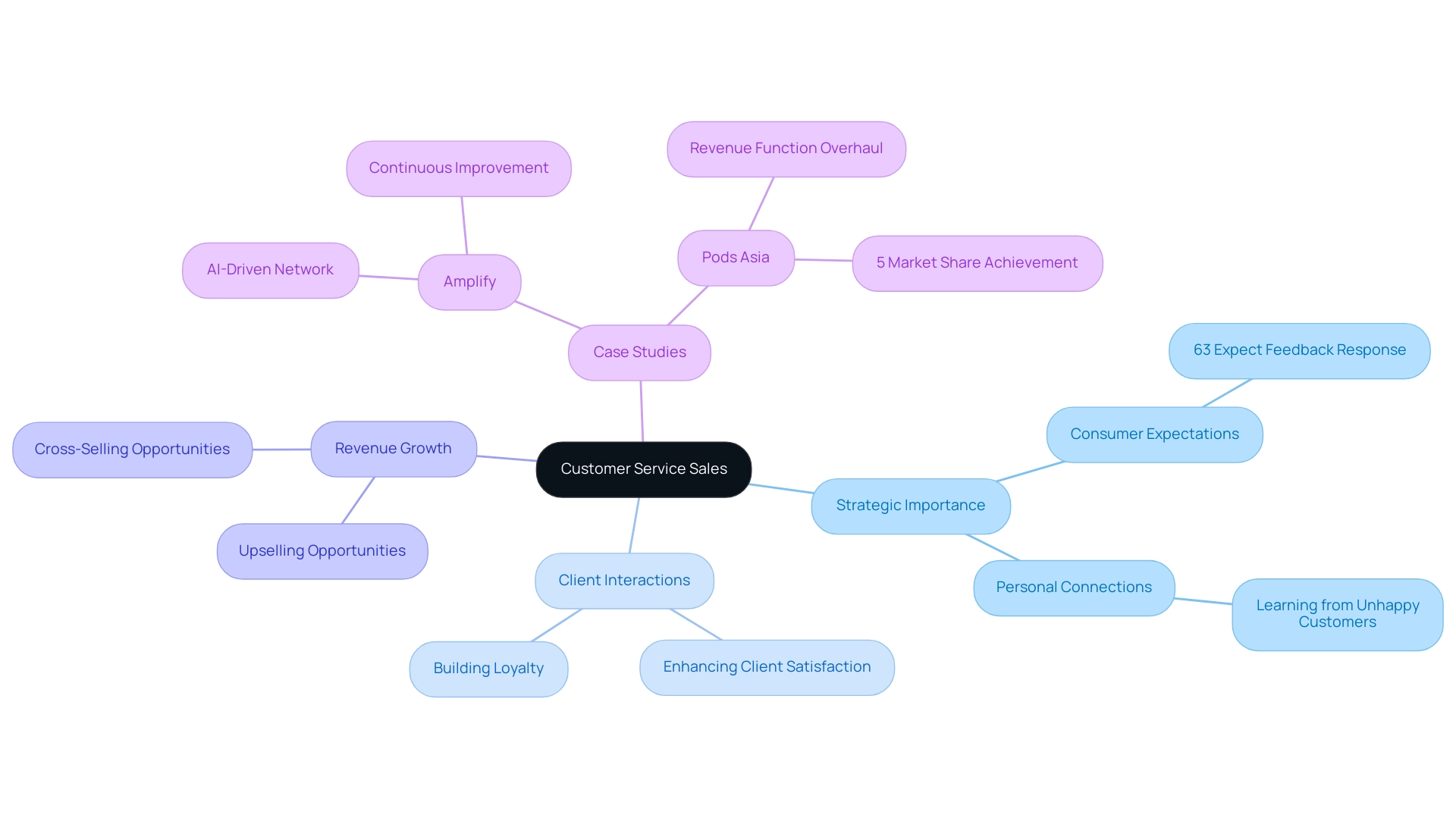
Client support and transactions are fundamentally linked, with efficient customer service sales playing a crucial role in influencing transaction results. In 2025, organizations increasingly acknowledge that well-trained support representatives in customer service sales can identify and leverage business opportunities during client interactions. By equipping these agents with consultative selling techniques that emphasize establishing credibility and effectively addressing client problems, businesses not only enhance customer service sales but also significantly increase the likelihood of repeat purchases.
For instance, when a service representative recognizes a client's requirement for an additional item, they can smoothly shift into a discussion about customer service sales, reinforcing the problem-solution dynamic essential for effective selling. This approach boosts customer service sales and enhances client satisfaction, creating a win-win scenario. A recent study revealed that 63% of consumers expect companies to actively listen and act on their feedback, underscoring the necessity for organizations to engage with clients and adapt based on their input.
Moreover, the investment in consumer behavior analysis is projected to rise, with 29% of support teams planning to allocate resources to this area in 2024. This trend emphasizes the increasing significance of comprehending client preferences and behaviors to boost revenue effectively. As sales groups increasingly embrace AI technologies—81% are investing in AI according to recent findings—personalized client interactions and enhanced transaction data quality are becoming standard practices.
The connection between customer service sales and revenue efficiency is additionally demonstrated by the reality that organizations promoting a client-focused culture emphasize long-term connections over immediate profits. As Sam Walton famously stated, "There is only one boss. The client. And he can fire everybody in the company from the chairman on down, simply by spending his money somewhere else." By combining client support training with marketing strategies, especially those detailed in Magical Selling's training modules such as the 'Net Neutral Account – Module 7' costing $169.00, companies can promote customer service sales feedback and enable their teams to perform at their utmost capability, ultimately resulting in sustainable growth and improved sales performance.
Furthermore, testimonials from individuals involved in the 'Net Neutral Account – Module 7' emphasize its efficiency in enhancing marketing strategies: "This module changed our method of engaging with clients, making us more proficient in recognizing and responding to client requirements." Customers increasingly pay attention to companies' ethical practices and sustainability efforts, which can influence their purchasing decisions. By aligning client support strategies with these values, organizations can further enhance their revenue results.
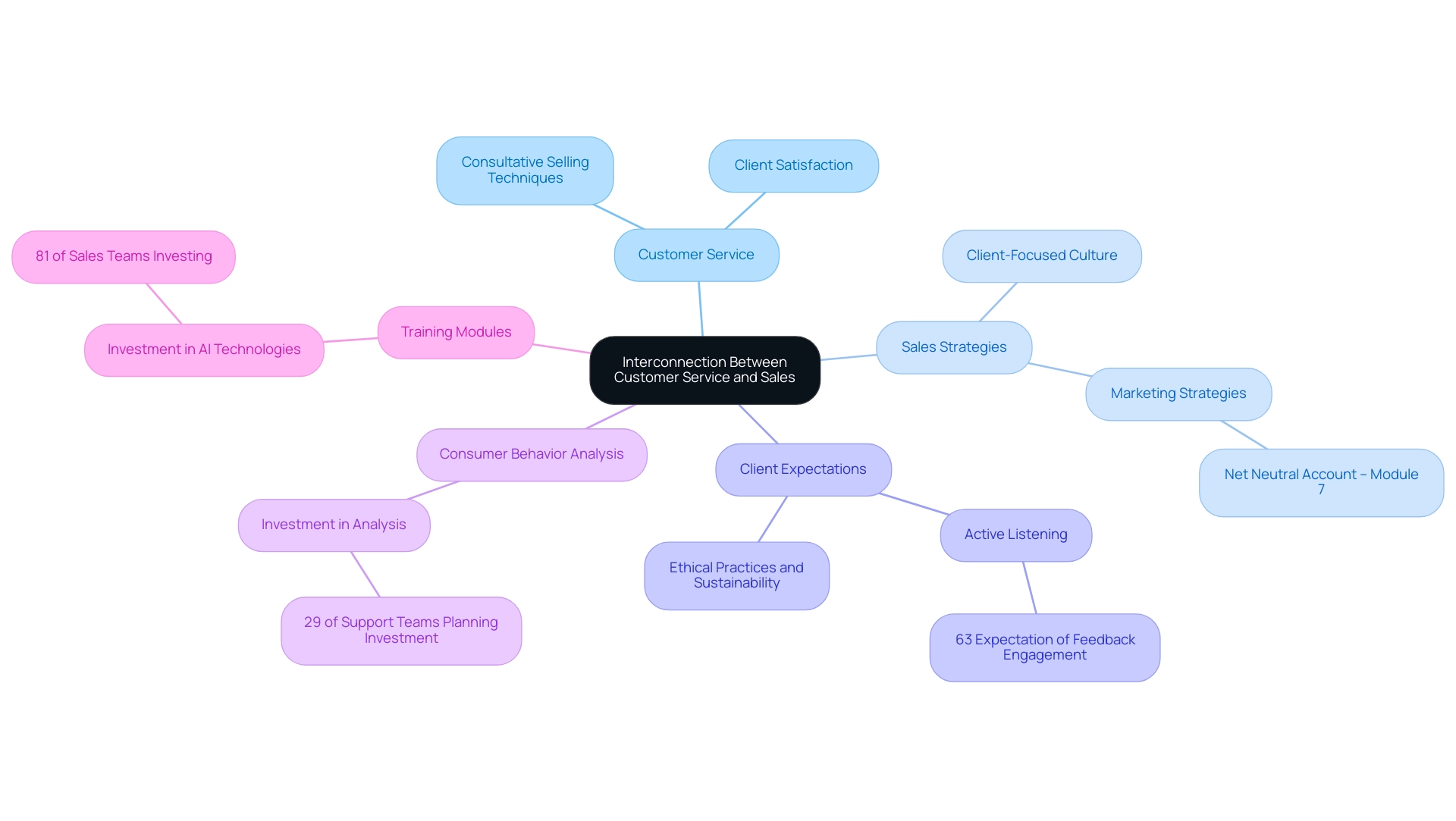
To enhance customer service sales revenue, companies can implement a range of effective strategies, notably by adopting innovative selling frameworks from Magical Selling. A primary strategy involves educating support representatives in customer service sales techniques, empowering them to identify and seize business opportunities. This training, part of the Sales Gym membership priced at $150 per month, not only equips them with essential skills but also cultivates a proactive mindset that can significantly influence customer service sales outcomes.
In fact, 68% of clients leave a company due to inadequate customer service sales, underscoring the critical need for well-trained representatives who can engage clients effectively.
Moreover, integrating a client relationship management (CRM) system is vital. Such systems enable businesses to track client interactions and preferences, facilitating personalized assistance that resonates with clients. The 2024 SPOTIO State of Field Sales survey indicates that 73% of participants plan to expand their teams in the coming year, highlighting the importance of equipping teams with the right tools and training to meet increasing demands.
Fostering a culture of collaboration between sales and customer service teams is another essential strategy. When both departments align their objectives, they can create a seamless customer service sales experience that drives satisfaction and loyalty. Additionally, utilizing data analytics to understand client behavior can inform targeted marketing initiatives and enhance service delivery.
For instance, the development of outbound marketing tactics exemplifies the success of personalized engagement and specific follow-ups. Despite challenges, 69% of buyers still respond to cold calls, demonstrating that tailored communication can yield positive results. This aligns with the discussed strategies, as companies adopting smarter outbound practices can significantly improve their success rates.
Firms like Magical Selling have effectively integrated development programs, including approaches such as the Heart of the Deal Method and the Problem Statement Method, which equip their teams with the skills necessary to enhance customer service sales and improve client interactions, showcasing the tangible benefits of investing in both education and technology.
As sales teams increasingly invest in AI—81% according to Salesforce 2024—these technologies can further enhance sales data quality and facilitate personalized client interactions, ultimately boosting overall performance in service transactions. By participating in Pods Asia's MAGIC Sales Academy, businesses gain access to comprehensive training and support aimed at transforming enterprise commerce through tailored strategies and continuous learning. Discover how Magical Selling can assist your team in improving client interaction and driving revenue by enrolling in the Sales Gym membership today.
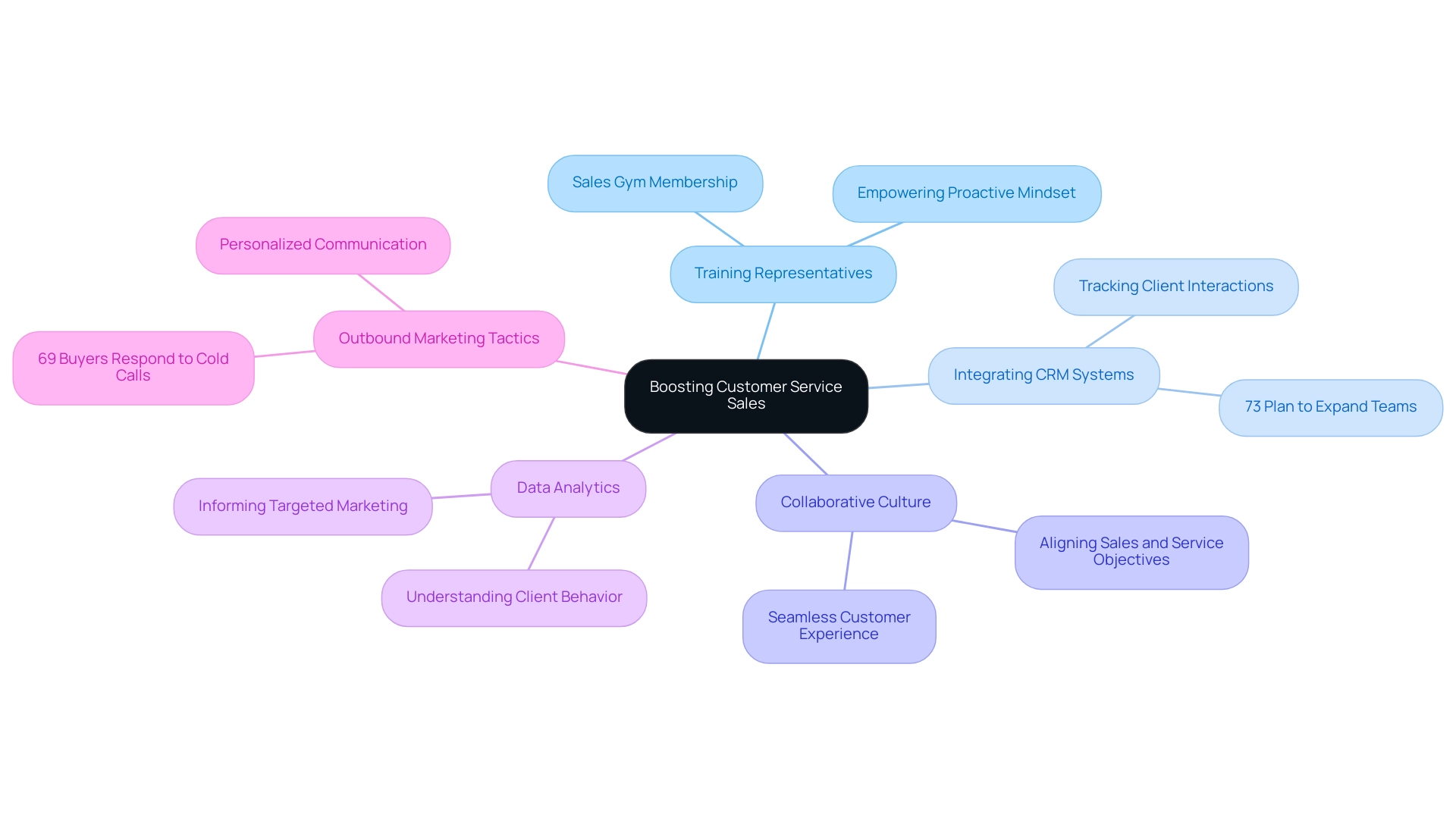
Combining client support with transactions is essential for enhancing client engagement, yet it often presents significant challenges. A primary issue lies in the insufficient training of service representatives in customer service sales techniques, resulting in missed opportunities for upselling and cross-selling. Notably, the average B2B sales process took 25% longer in 2024 compared to five years earlier, underscoring the pressing need for more effective integration strategies.
Furthermore, siloed departments can hinder communication and collaboration, leading to inconsistent client experiences. Alarmingly, 12% of clients in the USA report difficulties in locating the information they require through self-service portals, highlighting the gaps that may emerge from inadequate integration. Additionally, 52% of assistance specialists observe that clients prefer a 'human-only' approach to address their inquiries, emphasizing the critical importance of efficient training and collaboration between customer service sales and support.
To address these challenges, organizations must prioritize comprehensive development initiatives, such as those offered by Magical Selling, which equip support teams with crucial skills in customer service sales through our unique Sales Bond approach. For instance, our Discovery Workshops focus on identifying the kryptonite in sales groups and fostering a sales mentality among support representatives. These workshops employ methodologies such as role-playing and scenario-based training, significantly enhancing their capacity to recognize and act on business opportunities.
Moreover, fostering a culture of teamwork through regular interdepartmental meetings and shared objectives can improve communication and alignment between the sales and support teams.
As Sam Walton famously stated, "There is only one boss. The client. And he can fire everybody in the company from the chairman on down, simply by spending his money somewhere else." This quote underscores the importance of prioritizing client needs in both transactions and support.
Case studies illustrate the effectiveness of these strategies. Companies like Patagonia have successfully integrated sustainability into their client support strategy, enhancing brand loyalty by resonating with the values of eco-conscious consumers. This demonstrates that when support teams are well-trained and empowered to engage in discussions, they can contribute to a more cohesive strategy that optimizes both customer service sales and client satisfaction.
Ultimately, investing in innovative training solutions like our Discovery Workshops and promoting collaboration between support teams and customer service sales divisions is vital for achieving success in today's competitive market.
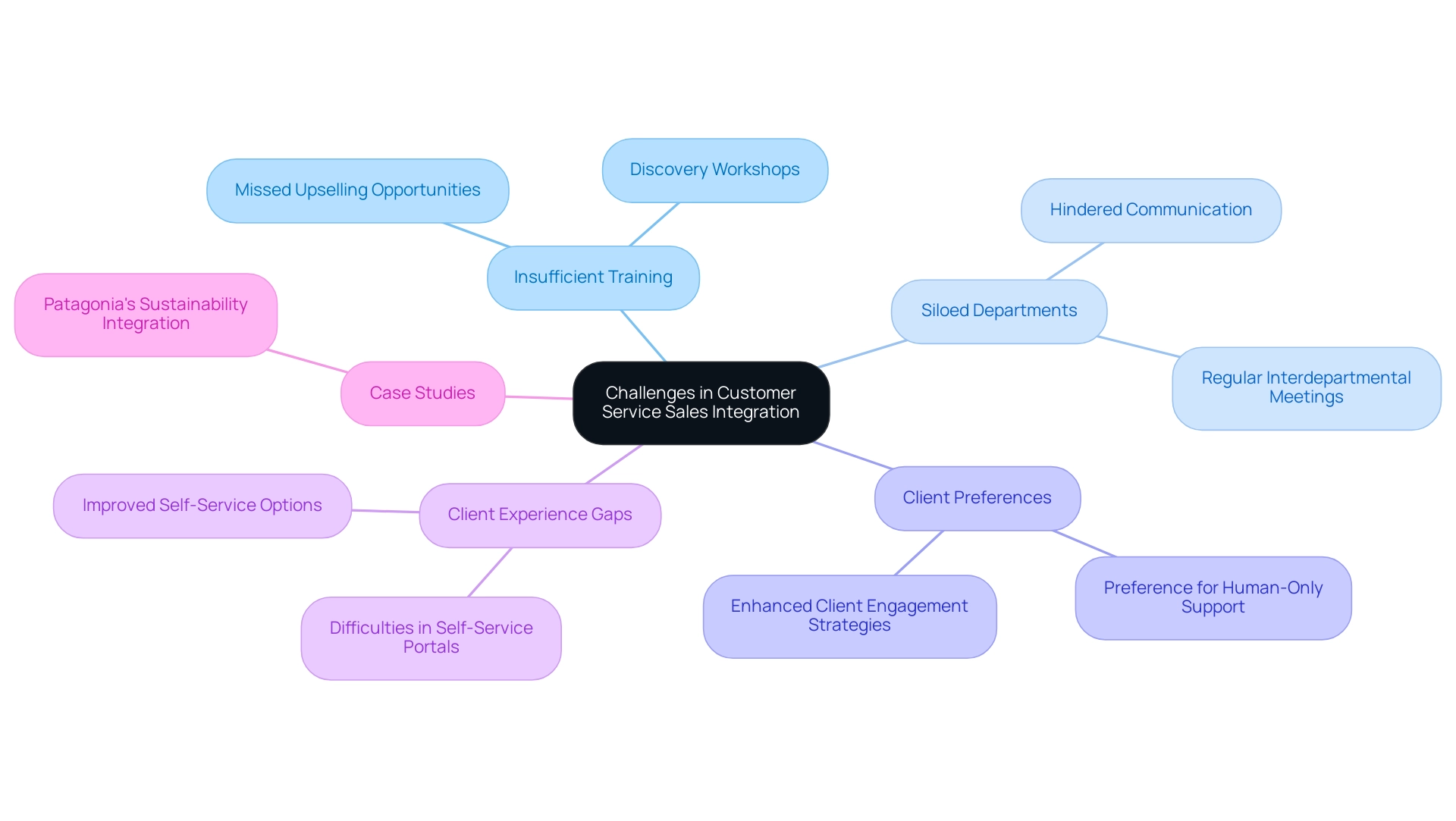
In 2025, the quality of customer service sales stands as a crucial element that directly influences revenue performance and client retention. Research indicates that a staggering 73% of consumers are likely to switch to a competitor after experiencing multiple instances of subpar assistance. This statistic underscores the imperative for businesses, particularly regional infrastructure providers, to overhaul their Go-To-Market (GTM) and marketing strategies, emphasizing outstanding customer service sales as a fundamental component of their approach.
Companies that invest in training and resources for customer service sales not only cultivate positive experiences for their clients but also foster long-term loyalty and drive revenue growth.
As the competitive landscape intensifies with the presence of cloud giants, organizations are increasingly turning to innovative solutions. In fact, 81% of sales groups are now investing in artificial intelligence to enhance client interactions and improve revenue data quality. This shift reflects a broader trend wherein 88% of leaders anticipate that AI will significantly enhance their CRM processes within the next two years.
Such advancements empower businesses to provide personalized experiences that resonate with clients, ultimately leading to higher retention rates.
Furthermore, the influence of customer service sales quality on revenue performance cannot be overstated. As IBM aptly stated, "Automation applied to an inefficient operation will magnify the inefficiency," emphasizing the importance of aligning customer service sales strategies with transformative business solutions. Companies that adopt a flexible approach to win strategies and comprehend the categorization of objections—specifically the three categories of objections: price-related, product-related, and service-related—demonstrate that tactical agility and expertise in commerce can lead to success in dynamic markets.
This understanding equips teams to address concerns effectively and maintain engagement with potential clients.
Moreover, aligning support strategies with ethical practices and sustainability initiatives, as exemplified by companies like Patagonia, can strengthen loyalty and enhance brand reputation among eco-conscious consumers. This alignment not only meets clients' needs but also results in higher revenue, as satisfied clients are more inclined to recommend the business to others. In reality, 84% of B2B decision-makers initiate their purchasing process with a recommendation, highlighting the significance of excellent customer service sales in generating referrals and boosting revenue.
In summary, outstanding customer service sales is not merely a support function; it serves as a strategic resource that enhances revenue performance and client retention. By concentrating on quality support and leveraging transformative sales-as-a-solution offerings, businesses can establish a competitive edge that fosters sustainable growth and success in the marketplace.
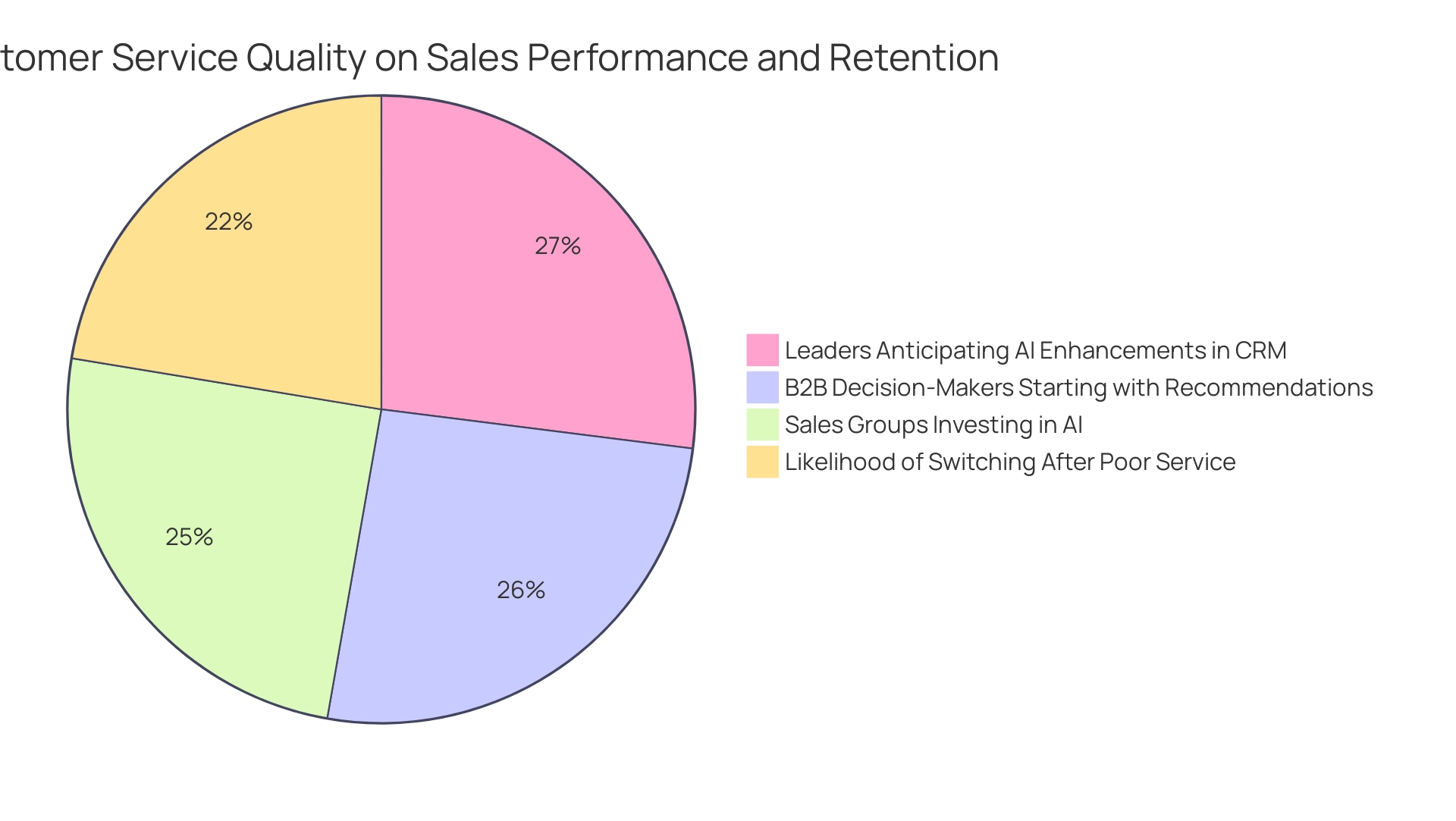
Training and development are paramount to the success of customer service sales, equipping teams with essential skills and knowledge to engage clients effectively and identify business opportunities. Key focus areas encompass:
Frequent workshops, objection mastery instruction, and role-playing scenarios not only strengthen these skills but also foster confidence among team members, enabling them to navigate complex interactions with ease.
In 2025, the emphasis on continual development programs is more vital than ever, necessitating adjustments to swiftly changing market conditions and evolving client expectations. Organizations prioritizing these initiatives are better positioned to maintain a competitive edge. For instance, statistics reveal that 56% of sales experts leverage social media to discover new prospects, underscoring the need for training that incorporates digital engagement tactics.
Moreover, the typical B2B sales process now demands 25% more time than it did five years ago, as highlighted by Biznology, making effective instruction crucial in overcoming these challenges.
Firms like Magical Selling exemplify this proactive strategy by offering customized development programs aimed at empowering teams in customer service sales transactions. Their commitment to continuous improvement ensures that sales professionals are equipped with the latest techniques and fully understand the nuances of customer interactions, thereby enhancing their customer service sales, including establishing credibility and effective problem-solution dynamics. Additionally, organizations focusing on customer service sales are 51% more likely to meet their quotas, emphasizing the tangible benefits of effective instruction in digital engagement.
Discover our instructional modules, starting at just $169.00, to elevate your team's skills and performance. Case studies illustrate the impact of robust training initiatives. For example, the resilience of door-to-door marketing shows that despite the rise of digital methods, face-to-face interactions continue to be effective.
Effective teams frequently engage in high-volume prospecting, canvassing neighborhoods multiple times to maximize engagement and conversion opportunities. This persistence, combined with effective instruction from Magical Selling, results in an impressive 90% engagement rate among residents. Furthermore, with 75% of B2B buyers utilizing social media for purchasing decisions, the significance of comprehensive customer service sales training and development programs cannot be overstated, establishing them as a cornerstone of successful sales strategies in 2025.
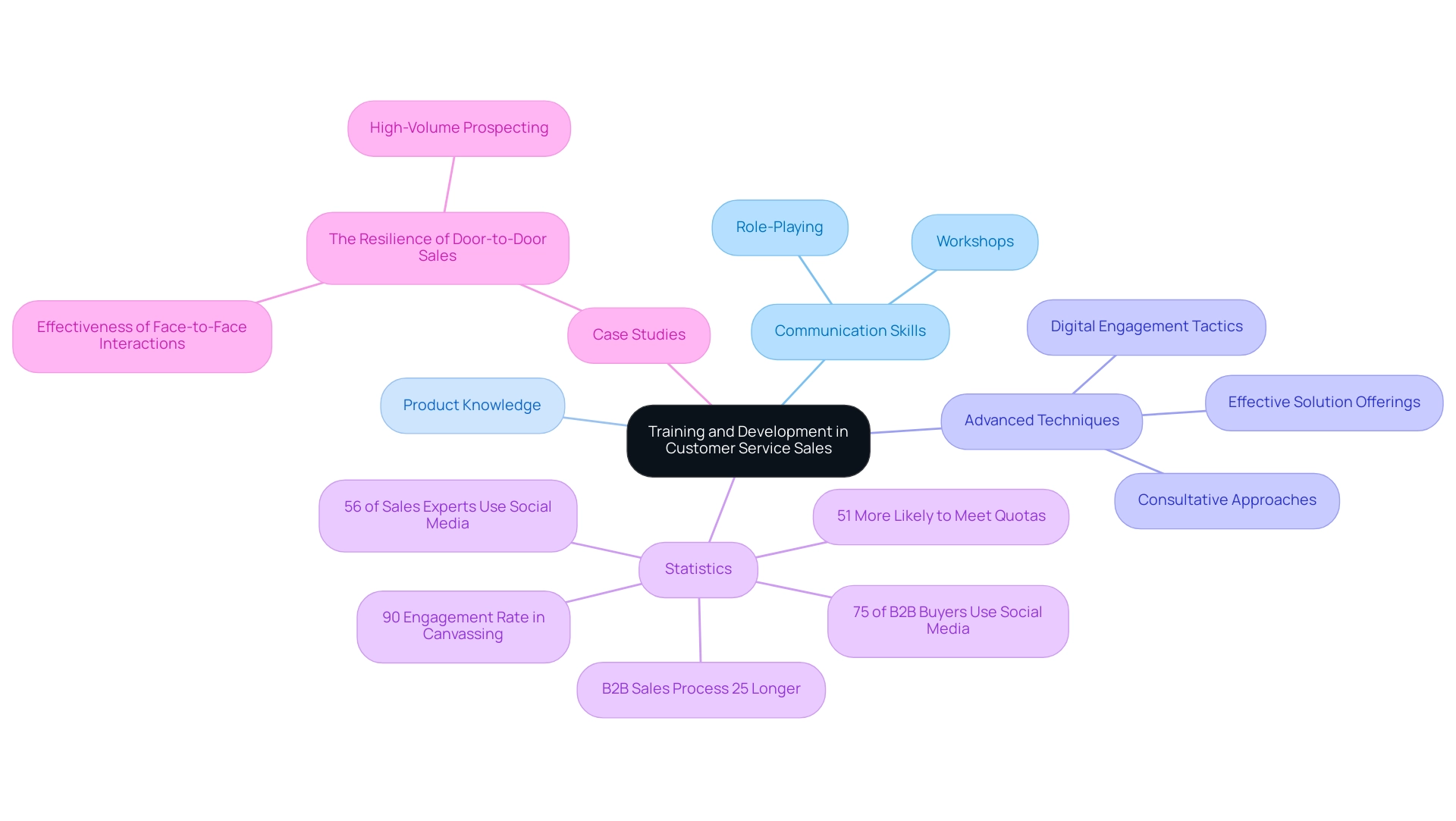
The integration of customer service and sales is essential for achieving growth and cultivating customer loyalty in 2025. This strategic approach enables businesses to transform service interactions into sales opportunities, effectively meeting rising consumer expectations and driving revenue through upselling and cross-selling.
Well-trained customer service representatives play a pivotal role in identifying these sales opportunities, fostering meaningful connections that boost satisfaction and long-term loyalty. A deep understanding of customer behavior is crucial for informing targeted marketing efforts and enhancing service delivery.
Organizations encounter challenges such as inadequate training and departmental silos; however, these obstacles can be surmounted through comprehensive training programs and a culture of collaboration. Success stories consistently demonstrate that exceptional customer service correlates directly with improved sales performance and heightened customer retention. Furthermore, aligning service strategies with ethical practices and sustainability initiatives resonates with consumers, further solidifying brand loyalty.
Ultimately, prioritizing training and development equips teams with the necessary skills to navigate complex customer interactions effectively. By recognizing customer service as a strategic asset, businesses can convert every interaction into a growth opportunity, securing a competitive edge in the dynamic landscape of 2025.
What is customer service sales and why is it important?
Customer service sales is a strategic approach that uses client interactions to boost revenue and enhance client satisfaction. It is essential in today’s business environment to meet high customer expectations and foster loyalty, particularly for local infrastructure providers competing against larger cloud companies.
How can companies excel in customer service sales by 2025?
Companies can excel by effectively addressing client needs while creating upselling and cross-selling opportunities. This dual focus is crucial for driving revenue growth, as satisfied clients are more likely to make repeat purchases and recommend the service to others.
What role does client feedback play in customer service sales?
Client feedback is critical as 63% of consumers expect businesses to listen to and respond to their feedback. Engaging with dissatisfied clients can provide valuable insights that refine customer service sales strategies.
Can you provide an example of a successful customer service sales strategy?
An example is Amplify, which transformed its operations by using an AI-driven network that improved technology, personnel, and processes in contact centers. This led to enhanced performance and client loyalty, demonstrating how operational efficiency can improve revenue outcomes.
What is the projected growth rate of the global D2D market until 2030?
The global D2D market is projected to grow at an annual rate of 6.4% until 2030, highlighting the importance of effective customer service sales and client engagement in a competitive landscape.
What is the significance of training support representatives in customer service sales?
Well-trained support representatives can identify and leverage business opportunities during client interactions. By using consultative selling techniques, they enhance customer service sales and increase the likelihood of repeat purchases.
How is consumer behavior analysis expected to change in 2024?
Investment in consumer behavior analysis is expected to rise, with 29% of support teams planning to allocate resources to this area, emphasizing the importance of understanding client preferences to boost revenue.
How are AI technologies impacting customer service sales?
A significant number of sales groups, 81%, are investing in AI technologies to enhance personalized client interactions and improve the quality of transaction data, making these practices standard in customer service sales.
What cultural approach do organizations promoting customer service sales typically adopt?
Organizations that emphasize a client-focused culture prioritize long-term relationships over immediate profits, recognizing that clients have the power to choose where to spend their money.
How can companies align their client support strategies with ethical practices?
By aligning client support strategies with ethical practices and sustainability efforts, organizations can enhance revenue results, as customers increasingly consider these factors in their purchasing decisions.